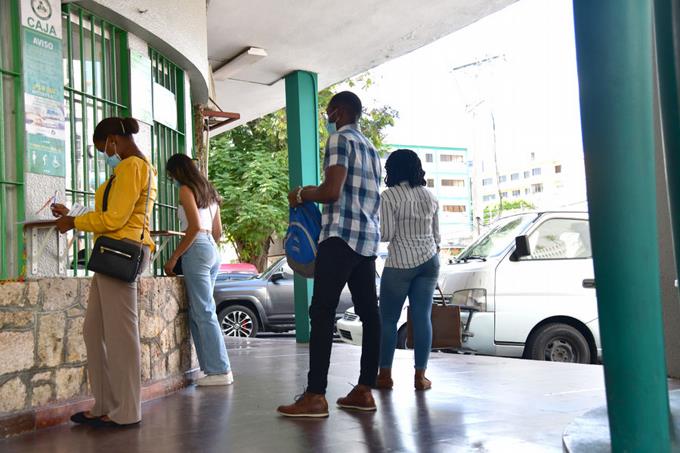Haitian students pursuing university degrees in the Dominican Republic will not be affected by the government action that has suspended, indefinitely, the special visa program for schoolchildren from the neighboring country.
On the other hand, this official ruling applies only to all those who, from now on, may be interested in applying for the aforementioned visa program, as the State Department reported to Listín Diario last night.
Until yesterday, Haitian students were unaware of the scope of the action by the Dominican government, as well as by the Ministry of Higher Education, Science and Technology (Mescyt), although its minister, Franklin García Fermin, complied with the decision “in all its parts”.
Anna and Peter are Haitian brothers who study here at the expense of their parents, both are merchants in Haiti. Sitting in a bank of the General Directorate of Immigration, where they asked to renew their student cards, with valid visas, they admit that they do not know what the suspension of the visa program consists of.
Anna graduated in medicine in June from the Autonomous University of Santo Domingo, but was unable to start an internship in a hospital because one of the requirements was to change her immigrant status from student to resident.
She focuses on those plans. “If I can’t here, I aspire to be in Spain,” says the young woman, in a low voice, reluctant to take pictures of her and get to know herself.
She, 26, as the “protector” of her younger brother, Peter, 22 (a pseudonym, as Anna), expects him and says he hasn’t finished his career in Utsa. Peter, who is in his final year of engineering, is looking forward to finding work in the country when he graduates as an industrial engineer. They both pay a large amount of money to study and live here.
Anna, for her part, paid an average of $1,000 per semester at UASD; Peter, 4,000 pesos per month at Otesa, depending on the credits he scores in the semester. “It’s expensive, we pay rent, electricity, internet and we have expenses,” Anna says.
Graduates return to Haiti
Luana, also a student, studied social communication in Utsa, had already completed her training, and after graduation she returned to Haiti.
There he married, has two children and runs his family’s business. Lestine told Diario that her family’s effort and the opportunity the state gave her were the key to her satisfaction.
Like Anna and Peter, the university authorities and others also do not know whether or not the procedure for suspending the visa program for Haitian students includes the renewal of those currently studying, as they have to renew it every year.
According to the statistics of the Ministry of Higher Education, Science and Technology (Mescyt), as of 2019, 9,208 foreigners are studying in the Dominican Republic, the largest group of which is 6,023 – Haiti.
The second largest group is the Americans, numbering 1,558 students; 548 Venezuelan; 402 Puerto Rico; 201 Colombian; 158 Cubans; 142 Spaniards 62 Italian 50 Peruvians; 64 Italian and 52 Mexican.
Minister welcomes measures
While an executive at the Dominican Association of Private Universities said that a meeting had been called to discuss the issue, and yesterday she confirmed that she did not know the details of the government action, which was announced by the Deputy Minister for Congressional Affairs and Immigration, Gazel Roman. .
formality
Requirements
Most Haitian students come to the Dominican Republic on tourist visas, then enroll in university and with this document they go to the Ministry of Foreign Affairs and apply for a student visa. Later, they go to Migration and their credit card is issued as a student. On these procedures they spend between 10,000 and 12,000 thousand pesos.

“Music buff. Social media lover. Web specialist. Analyst. Organizer. Travel trailblazer.”

:quality(85)/cloudfront-us-east-1.images.arcpublishing.com/infobae/TEQF6EONZRFGLLLDIDD4L2O4EE.jpg)

:quality(75)/cloudfront-us-east-1.images.arcpublishing.com/elcomercio/XU32LRAEZFDDPNVHLFU3CKVBYY.jpg)



More Stories
Sheinbaum, Galvez, Mainz campaign wrap-up, news and more
Sheinbaum and Mainz’s CDMX campaign wraps up: Road Alternatives and Street Closures
Ortega attacks Humberto Ortega and declares him a “traitor to the country”